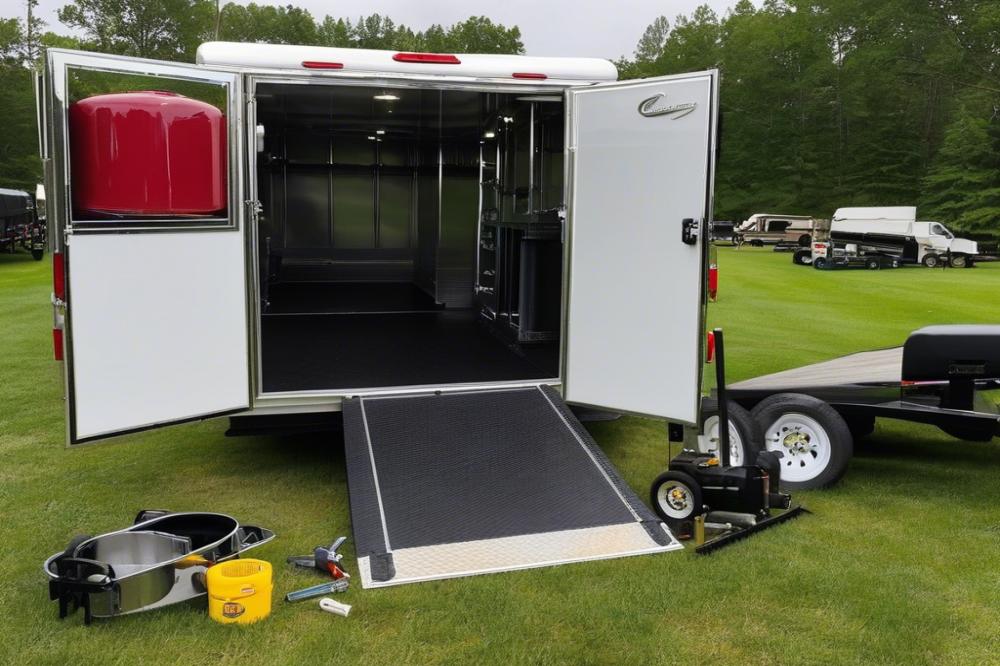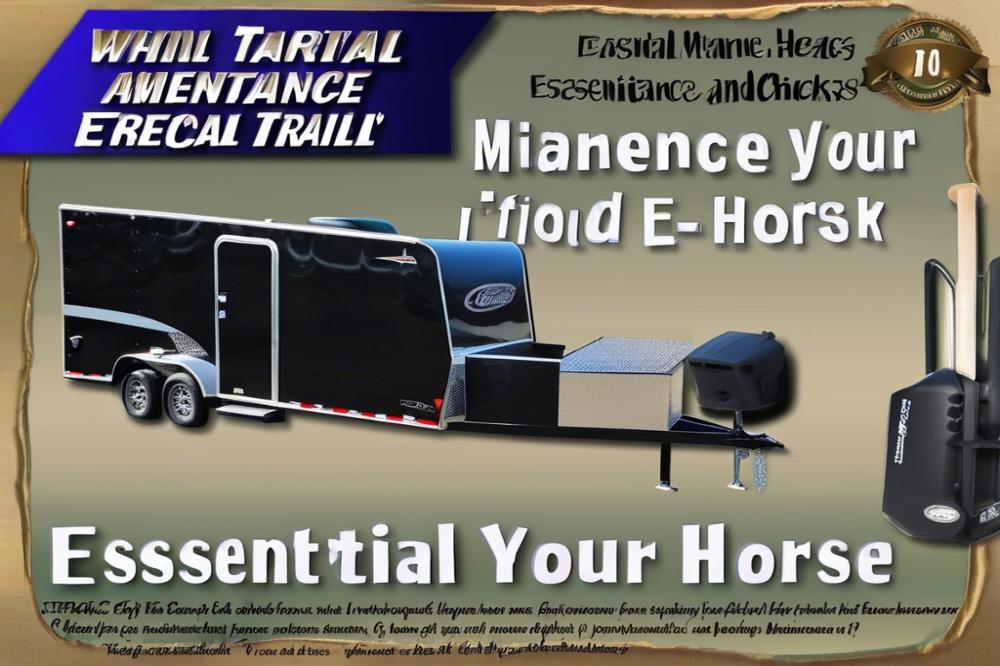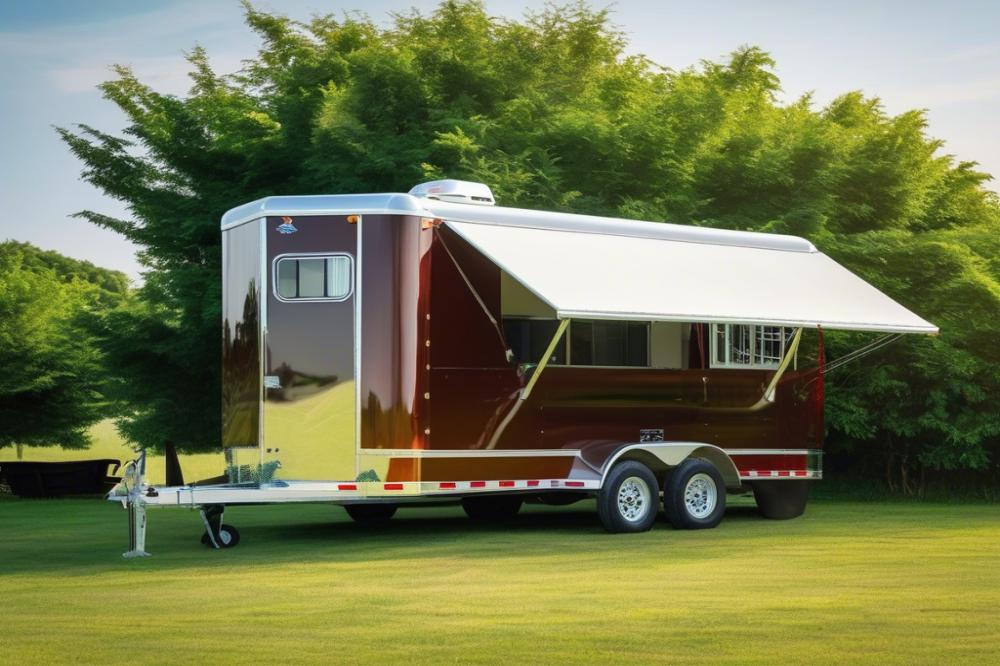Essential Maintenance and electrical checks for Your Horse Trailer
Keeping a horse trailer in top shape is crucial for the safety of your horses. Regular inspections prevent potential hazards that could arise during travel. Each journey brings unique challenges, thus making it essential to commit to thorough upkeep. An unreliable trailer can lead to dangerous situations, putting both the animals and drivers at risk.
Horse owners understand the bond with their steeds. That bond demands responsibility, especially when it comes to transport. Knowing your horse trailer is ready to go can ease many concerns. Safety begins with a clear plan for checks and maintenance.
You must pay attention to both the mechanical parts and the electrical components. Regular maintenance should include tire inspections, brake checks, and a look at the trailer’s structural integrity. Additionally, don’t overlook electrical checks that ensure lights and signals are functioning well. These elements work together for a safe experience on the road.
Engaging in this routine might seem like a burden at times. However, the benefits are significant. A well-maintained trailer not only serves you better but also contributes to the comfort and security of your horses. As you prepare to travel, remember these essential practices. They make a difference.
horse trailer maintenance

Regular upkeep is crucial for the optimal performance of your horse trailer. The right maintenance can prevent bigger problems down the road. Focus on a few key areas to keep everything in top shape. Ensuring safety is your number one priority.
Check the tires frequently. The condition of the tires directly impacts towing safety. Look for any signs of wear or damage. It’s a good idea to inspect the air pressure, too. Maintaining the proper inflation helps with fuel efficiency and handling.
Brakes need attention as well. They are essential for stopping your trailer safely. Flushing the brake fluid every year can prolong their life. Make time to test the brakes regularly for responsiveness.
The electrical system is another area not to overlook. Lights and signals must function correctly. A malfunction can lead to dangerous situations on the road. Regularly examine the wiring for any breaks or frays. Ensure that all connections are secure and free of corrosion.
Regular cleaning of the interior keeps your trailer fresh and free from odors. A clean environment is better for your horse’s health. Wash walls and floors, removing any debris that may have accumulated. Pay special attention to the area where your horse stands.
Inspect the hitch and coupling mechanisms often. They play a crucial role in keeping the trailer attached to your vehicle. Lubrication should be part of your maintenance routine. It helps prevent rust and ensures smooth operation.
Regular checks of the trailer’s frame and body can reveal hidden issues. Look for signs of rust or damage. If you spot anything unusual, take care of it promptly. Addressing issues early can save money and time in repairs.
Checking the floor for weak spots is vital, too. The flooring supports your horse’s weight and movement. If it feels soft or sponge-like, consider replacing sections. This will protect both your trailer and your horse.
trailer safety

Safety is critical when it comes to trailers. An unsafe trailer can lead to dangerous situations for both the horse and the driver. Regular checks help prevent accidents and ensure a smooth journey. Every time you hitch your trailer, conduct a safety check. This quick assessment can save lives.
Begin by examining the tires. Look for any signs of wear, bulges, or low tread depth. Proper inflation is also vital for safe traveling. Shift your attention to the brakes next. Inspect them to ensure they respond correctly. A malfunctioning brake system can be catastrophic.
The lights need your focus too. Check the brake lights, turn signals, and running lights. Functional lights are essential for visibility on the road, especially at night. Furthermore, don’t overlook the safety chains. These should be secure and free from damage.
While inspecting your trailer, the floor should not be ignored. Look for soft spots or rot. A solid floor is crucial for the horse’s safety. Stability is key when traveling. Periodically check the hitch for any signs of wear or damage.
Lastly, take time to review the trailer’s overall condition. Rust, corrosion, or loose parts can lead to bigger problems down the road. A thorough inspection doesn’t take long, but it is invaluable for ensuring safety.
Brake Inspection
Brake functionality holds great importance for safe traveling with your horse trailer. A well-functioning brake system can mean the difference between a smooth ride and a dangerous situation. Most accidents occur due to brake failure. Ignoring this aspect of maintenance can lead to severe consequences. Regular checks can save lives, both human and equine.
Begin by visually inspecting the brake components. Look for any obvious damage or wear. Check the brake pads; they should not be excessively worn down. A good standard is that the friction material should not be less than a quarter of an inch thick. Next, examine the brake lines for any signs of leaks. Any fluid dripping or stained lines should prompt immediate attention.
Testing the brake functionality is crucial. Pull your trailer onto a flat surface. Once there, engage the handbrake and try to push the trailer. If it rolls, the brakes may not work properly. It’s also helpful to test the braking response during a slow drive. Check how well the brakes respond when you apply pressure. Listen for any unusual noises as you brake. Grinding or squeaking sounds can indicate a major issue.
Don’t forget to look over the electrical connections related to the brake system. If your trailer uses electric brakes, check the wiring. Look for frays, corroded connectors, or loose wires. These problems can cause brake failure, especially when you need them most. Also, inspect the brake controller in your towing vehicle. Ensure it functions correctly, as it directly affects brake performance.
Finally, keep records of your inspections. Documenting the condition of your brake system helps track changes over time. Regular maintenance keeps everyone safer on the road. Always prioritize these checks before longer trips or during seasonal changes. A thorough inspection fosters greater peace of mind for both you and your horse.
Tire Maintenance
Keeping an eye on your trailer’s tires is crucial. Regularly checking tire condition and pressure can save you from unexpected problems. A tire that looks worn might be at risk. Look for any cracks, bulges, or flat spots. These issues can become serious if not addressed quickly.
Pressure also plays a significant role in your tires’ performance. Under-inflated tires can lead to blowouts, while over-inflated ones may wear down unevenly. Use a reliable pressure gauge to monitor this important aspect. Follow the manufacturer’s recommendations for optimal pressure levels.
Another key factor is tread depth. Tread helps maintain traction on the road. It’s easy to overlook this, but insufficient tread can compromise safety. Use a penny to check: insert it into the tread; if you can see all of Lincoln’s head, it’s time to replace the tire.
Age is another critical element in tire maintenance. Tires can age even if they haven’t been used much. Most manufacturers recommend replacing tires every six years, regardless of wear. Make sure to check the sidewall for the date of manufacture. Outdated tires may be more prone to blowouts, which can endanger you and your horses.
In summary, maintain both the condition and pressure of your tires. Pay attention to tread depth and tire age as well. Taking these steps will help you transport your equine friends safely.
Lighting System
Visibility is critical when you’re towing a horse trailer, especially on dark roads or in bad weather. Drivers need to see your trailer clearly, and you must be able to signal your intentions. A well-functioning lighting system plays a major role in promoting safety for everyone on the road. Issues with visibility can lead to accidents, which is why regular checks are essential.
Start by inspecting the exterior lights. This includes the brake lights, turn signals, and running lights. Make it a habit to check these bulbs often, especially before long trips. Over time, light bulbs can burn out. Driving with a malfunctioning light can put you and your horse at risk.
Next, examine all wiring connections. Look for cracks or fraying that could lead to short circuits. Damaged wiring can hinder the performance of your lighting system. It is crucial to replace any faulty components right away. Electrical problems can escalate quickly if unattended.
When replacing bulbs, choose options that match your trailer specifications. Using the wrong type can create compatibility issues. Always ensure the replacement bulbs are of quality make to last longer. This simple step can save time and money in the future.
Remember to check the interior lights as well. While often overlooked, they are important for aiding visibility when loading and unloading your horse. Replace any burnt-out bulbs to keep your work area well-lit during the evening hours. A little maintenance goes a long way in enhancing safety and convenience.
By keeping your lighting in top condition, you boost visibility and signaling on the road. It’s one of those things that should never be ignored. Make these checks a part of your regular trailer maintenance routine. Your horse and your safety depend on it.
Battery Check
Keeping your battery in good shape is crucial. A healthy battery powers lights, brakes, and any electrical systems onboard. Without it, you could find yourself in a challenging situation. Regular battery checks can save you headaches later. Understanding how to maintain it will help ensure that your trailer remains functional when you need it most.
Importance of Battery Health
The battery serves as the heart of your trailer’s electrical system. If it isn’t functioning well, many features may not work. Problems with the battery can lead to unexpected breakdowns. This can put both you and your horse at risk. It’s vital to keep an eye on its condition, especially before embarking on a journey.
Steps for Checking Battery Charge and Connections
Start by inspecting the battery terminals. Look for signs of corrosion or dirt that could hinder electrical connections. Clean any corrosion using a mixture of baking soda and water. Make sure connections are tight to avoid interruptions in power flow. Next, use a multimeter to check the voltage. A fully charged battery should read around 12.6 volts or higher.
If the voltage is low, it may be time to recharge or replace it. Another important step involves checking the fluid levels. Some batteries, particularly lead-acid types, require water. Add distilled water if necessary, but make sure not to overfill. All these steps help maintain battery health and performance.
Regular checks are essential, especially before long trips. A little time spent on these tasks can prevent bigger issues. While it may seem tedious, remember that proper maintenance contributes to safer travels for you and your horse.
Wiring Issues
Common wiring problems in horse trailers
Damaged wiring is a frequent issue in horse trailers. Wear and tear can occur over time, especially if the trailer is frequently exposed to the elements. Corroded connectors often lead to faulty connections. Broken lights are another common problem. If the brake lights or turn signals fail to work, it is usually due to wiring issues. Additionally, frayed wires can cause shorts, leading to electrical failures. Sometimes, a blown fuse can signal an underlying wiring concern. Identifying these problems early can save time and money.
How to identify and resolve wiring issues
Checking the wiring is essential. Start by inspecting the exterior lights. If a light doesn’t illuminate, investigate the wiring for potential breaks. Look for any signs of corrosion where wires connect. Consider replacing any corroded parts immediately. A multimeter can help test the voltage along the wiring. This tool allows you to find broken connections more easily. Ensure the trailer’s ground wire is secure as loose grounds often lead to problems. If you suspect a short circuit, inspect wire harnesses for any signs of wear or damage.
Resolving wiring difficulties may require some basic tools. Having wire strippers, connectors, and electrical tape on hand is often helpful. When reattaching wires, make certain connections are secure. It’s wise to use heat-shrink tubing to protect repairs from moisture. If problems persist, seeking assistance from a professional may be the best course of action. Maintaining the electrical system can keep your trailer safe and functional.
Hitch Inspection
Checking the integrity of your trailer hitch is crucial for safe travels. The hitch connects your towing vehicle to the trailer. If it fails, the consequences can be severe. Accidents may happen, causing harm to both horses and people.
Inspecting the hitch involves looking for signs of wear. Fractures or rust can weaken its structure. Make sure bolts are tight and secure. Any looseness in the hitch can compromise your entire setup.
Regular attachment checks should be part of your routine. Take a moment before every trip to confirm that everything is properly connected. A swift inspection can save you from potential mishaps down the road. Avoid the risk by taking time to perform these checks.
Always keep an eye out for movement when hitching up. A wobbly connection indicates a problem that should not be ignored. Address these issues promptly to maintain confidence in your equipment.
Consider cleaning the hitch periodically, too. Dirt and debris can affect how it performs. By maintaining cleanliness, you increase the likelihood of a safe trip.
Finally, remember that even minor issues can become major problems. Regular inspections help catch these before they escalate. Your safety and the wellbeing of your horses depend on diligence.
Load Balance
Understanding load distribution is crucial for safe transport when using a horse trailer. Proper balance keeps the trailer steady and helps avoid accidents on the road. If the weight is unevenly distributed, it can lead to swaying or even tipping. Knowing how to position your horse and gear is key. Each animal’s weight, along with any additional equipment, plays a role in achieving that perfect balance.
Some tips can make the process easier. First, place the heavier items lower in the trailer. This lowers the center of gravity and helps maintain stability. Next, position your horse towards the front. This helps distribute the weight evenly across the trailer’s axles. Always secure any loose items. Loose gear can shift while driving, altering the load’s balance.
Moreover, consider the layout of your trailer. If it has separate compartments, use them wisely. This helps in keeping the horse calm during travel. When loading, make sure to check the weight on each side. An equal distribution helps with handling. Be mindful of any changes if you need to load additional equipment. Always assess how it will affect balance.
Lastly, before you take off, double-check everything. Walk around the trailer to observe if it appears level. A balanced load not only promotes safety but also enhances the comfort of your horse. Proper planning pays off while on the road. Transporting your horse safely requires attention to these details.
Emergency Equipment
Every horse trailer should be equipped with critical items for emergencies. A first aid kit is one of the most vital components. It should include bandages, antiseptic wipes, and scissors. Horses can get injured, and being prepared can make a real difference.
Road flares or reflective triangles are essential as well. They help make your trailer visible in case of a breakdown. Having these on hand can prevent further accidents or injuries, especially during low-light conditions.
A spare tire and the necessary tools for changing it are also important. You never know when a flat can occur. Changing a tire on the side of the road is no easy task, and having the right tools makes it manageable.
Many trailer owners overlook the importance of a fire extinguisher. Since trailers carry flammable materials, this can be a lifesaver. Make sure it’s easily accessible but secured in place to avoid mishaps.
It’s advisable to keep a rope or halter in the trailer. If an emergency arises, you may need to secure your horse quickly. This can prevent panic and ensure safety for everyone involved.
Preparing for emergencies is essential for all horse owners. Simply having these items can bring peace of mind. It’s not just about being ready; it’s about protecting your horse and yourself when unexpected events occur.
Always check equipment regularly. Having outdated or broken items can jeopardize your safety. Make it a point to review your emergency supplies each season, ensuring everything is in working order.
Final Thoughts on Trailer Care
We’ve covered a lot of ground regarding maintenance and electrical checks for your horse trailer. Performing regular inspections, especially for brakes, lights, and tires, is crucial for safe travels. Proper upkeep not only protects your animals but also provides peace of mind while on the road.
Remember to check the electrical systems regularly. Faulty wiring can lead to accidents and puts everyone at risk. Regular maintenance checks can catch these problems before they escalate. Every detail matters when it comes to trailer safety.
Prioritizing trailer care may seem tedious, but it pays off in the long run. Your horses deserve a secure environment, and you need confidence when towing. The right steps today can prevent issues tomorrow.
In conclusion, dedicating time to maintenance is not just beneficial; it’s essential. Make safety a priority in all your travels and you will enjoy the journey much more.



